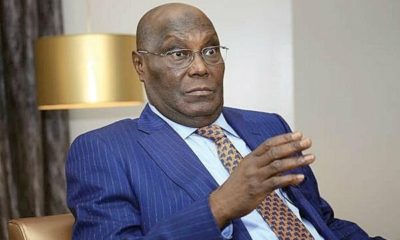For the umpteenth time, Alex Otti, Governor of Abia State, has come under immense attacks from the Peoples Democratic Party (PDP), in the state, this time over his alleged underhand dealings with retirees over their arrears of pensions.
Apart from pointedly lying over the issue, the main opposition party in the state, which lost power last year after 24 years, also accused the governor of squeezing the airpipes of the retirees to submit to an unholy deal in which they would forfeit part of their arrears as a condition for getting part of their pensions.
The party, in calling out the governor, dared him to come out clean on the issue, in a statement on Sunday, by Abraham Amah, PDP Vice Chairman and Acting State Publicity Secretary of the party in the state, who stressed that the claim by Otti to have cleared all the arrears due the retired workers, was false.
Against the back and forth claims in which the governor’s revelation that he had cleared 10 years arrears of pension in the state, is being disputed by the leadership of the pensioners, the PDP accused Otti of making unproductive efforts, seeking cheap popularity by peddling lies to confuse and deceive “the good but unsuspecting people of Abia State about the pension situation in the state.”
Regretting that the issue of the said pensioners had been trending for the wrong reasons, given the governor’s claim that he had cleared their outstanding nine years or ten years pension arrears, the party, pointed out manifest discrepancies the narrative from the government house.
“To show further proof that the claim is false and embellished with visible lies, there are discrepancies in the claim because, Alex Otti, his operatives and the pensioners do not agree on the accurate number of months cleared. While his Commissioner for Finance said nine years, Alex Otti in the United States, said ten years and pensioners insist that only a certain percentage of the nine months arrears owed them since the inception of the Otti administration were cleared. At this point, we will leave the judgment to discerning Abians,” the statement, said.
It cited a recent statement by the enlarged Executive Council-in-session of the Abia chapter of the National Union of Pensioners (NUP), dissociating itself from any agreement entered between the government and pensioners which purportedly stipulating that retirees would forgo all outstanding arrears as a condition for the regular payment of their monthly pension, the PDP decried Otti’s description of the NUP’s position that the said section of the agreement was a mistake and should be expunged as a huge joke.
Accusing the governor of taking advantage of the desperation of the pensioners to insert that obnoxious clause in that agreement, adding that such an action is the height of infidelity, especially as he had promised several times, during the campaigns and after the elections that he would clear any pension arrears he met in office, the party, insisted such ill-treatment must not be allowed.
The statement added: “While Abians are distraught and in shock that Governor Alex Otti could arm-twist and deceive desperate pensioners and trick them into signing an agreement that makes them forfeit their outstanding pensions, the Abia PDP is not, because it is typical of Alex Otti but we don’t want to get used to it as many Abians have already.
“And that is why we have a sacred duty to hold him to account for his deeds in office. Everything Alex Otti has touched since he became Abia governor has ended in unnecessary controversy and always proven him as one who is always economical with the truth.
“Otti ab initio was never ready to pay pension, otherwise he would not have pressured and tricked the leadership of NUP into signing an agreement to forgo its outstanding arrears. Did the agreement entered into with the leadership of the NUP expressly say that the government would claim to have paid in full pension arrears that were forfeited because Alex Otti at every given opportunity claimed that he has cleared all outstanding pension arrears in Abia?
“The records are clear that in the eight years of Dr. Okezie Ikpeazu, which amounts to 96 months, he paid 51 months pension and had an outstanding of 45 months which the NUP has acknowledged several times.
“Abia PDP wonders how 45 months suddenly turned to 9 or 10 years which Alex Otti consistently referenced during his toxic campaigns as an opposition figure. Unfortunately, he has carried on with his lies to the government and does not understand the boundaries between being in opposition and the government.
“Arising from the above, Abia PDP demands an explanation and wants to know where the balance 111 or 99 months are, as Alex Ott claims to have cleared 9 or 10 years arrears and will soon be reflected in Abia State quarterly expenditure records and used to fleece Abians.”
The party, while praising what it termed the courage and maturity of the NUP in handling the matter and encouraged it to take the dispute to arbitration for a quick resolution, stressed that it was inappropriate to ask one to forgo one’s arrears as a basis for receiving future entitlements.
“Governor Alex Otti should henceforth desist from saying that he has cleared all outstanding pension arrears because such a claim is not the true position. We urge him to stop using pensioners to promote his self-serving,” the party, added.

 News3 weeks ago
News3 weeks ago
 News4 weeks ago
News4 weeks ago
 News1 week ago
News1 week ago
 Columns2 weeks ago
Columns2 weeks ago
 News4 weeks ago
News4 weeks ago
 News3 weeks ago
News3 weeks ago
 News4 days ago
News4 days ago
 News6 days ago
News6 days ago



















